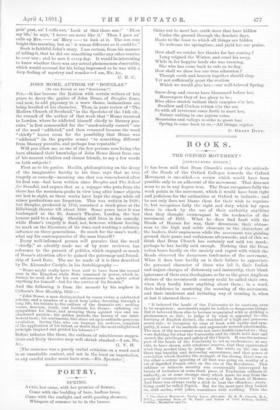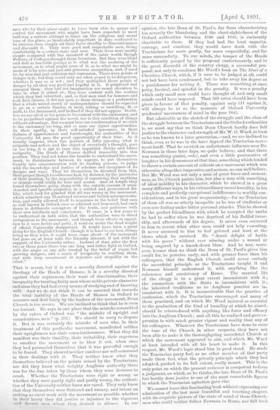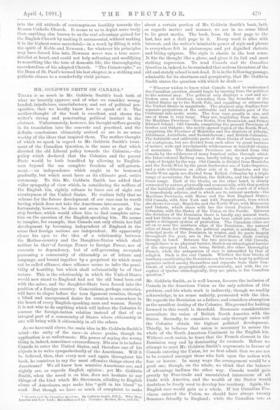BOOKS.
IT has been said that Dean Church's review of the attitude of the Heads of the Oxford Colleges towards the Oxford Movement is one-sided,—a review which would have been possible only to an adherent of the movement. That does not seem to us in any degree true. The Dean recognises fully the weak points in the movement, which it would have been right and judicious for the authorities at Oxford to indicate ; and he not only does not blame them for their wish to regulate it, but recognises fully the right and duty which lay upon them to check by the use of their authority anything that they thought extravagant in the tendencies of the movement of 1833. What he does find fault with the Heads of Houses for was, their denseness, their obtuse- ness to the high and noble elements in the characters of the leaders, their supineness while the movement was gaining ground, their panic and unfairness afterwards; and of this we think that Dean Church has certainly not said too much ; perhaps he has hardly said enough. Nothing that the Dean writes bears hardly on the anxiety and regret with which the Heads observed the dangerous tendencies of the movement. What it does bear hardly on is their failure to appreciate the personal character of those who led it, their foolish and unjust charges of dishonesty and insincerity, their blank ignorance of their own theologians, so far as the great Anglican divines of the seventeenth century could be called their own, when they hardly knew anything about them ; in a word, their indolence in mastering the meaning of the movement, and their intolerant and irritating way of treating it, when at last it alarmed them :— "It behoved the heads of the University to be cautious, even to be suspicious ; movements might be hollow or dangerous things. But it behoved them also to become acquainted with so striking a phenomenon as this ; to judge it by what it appealed to—the learning of English divines, the standard of a high and generous moral rule ; to recognise its aims at least, with equity and sym- pathy, if some of its methods and arguments seemed questionable. The men of the movement were not mere hostile innovators ; they were fighting for what the University and its chiefs held dear and sacred, the privileges and safety of the Church. It was the natural part of the heads of the University to act as moderators ; at any rate, to have shown, with whatever reserve, that they appreciated what they needed time to judge of. But while on the one side there was burning and devouring earnestness, and that power of conviction which doubles the strength of the strong, there was on the other a serene ignoring of all that was going on, worthy of a set of dignified French abWs on the eve of the Revolution. This sublime or imbecile security was occasionally interrupted by bursts of irritation at some fresh piece of Tractarian oddness or audacity, or at some strange story which made its way from the gossip of common-rooms to the society of the Heads of Houses. And there was always ready a stick to beat the offenders ; every- thing could be called Popish. But for the most part they looked on, with smiles, with jokes, sometimes with scolding. Thus the Tho Oxford Movement: Twelve: Years, 18334845. By It. W. Church, M.A., D.C.L., sometimo Donn of Si. Paul's and Fellow of Oriel College, Oxford. London: Mttemilinn And Co, men who by their place ought to have been able to gauge and control the movement, who might have been expected to meet half-way a serious attempt to brace up the religious and moral tone of the place, so incalculably important in days confessed to be anxious ones, simply set their faces steadily to discountenance and discredit it. They were good and respectable men, living comfortably in a certain state and ease. Their lives were mostly simple compared with the standard of the outer world, though Fellows of Colleges thought them luxurious. But they wore blind and dull as tea-table gossips as to what was the meaning of the movement, as to what might come of it, as to what use might be made of it by wise and just and generous recognition, and, if need be, by wise and just criticism and repression. There were points of danger in it; but they could only see what seemed to be dangerous, whether it was so or not ; and they multiplied these points of danger by all that was good and hopeful in it. It perplexed and annoyed thorn; they had not imagination nor moral elevation to take in what it aimed at ; they were content -with the routine which they had inherited ; and, so that men read for honours and took first classes, it did not seem to them strange or a profanation that a whole mixed crowd of undergraduates should be expected to go on a certain Sunday in term, willing or unwilling, fit or unfit, to the Sacrament, and be fined if they did not appear. Doubt- less we are all of us too prone to be content with the customary, and to be prejudiced against the novel, nor is this condition of things without advantage. But we must bear our condemnation if we stick to the customary too long, and so miss our signal opportunities. In their apathy, in their self-satisfied ignorance, in their dulness of apprehension and forethought, the authorities of the University let pass the great opportunity of their time. As it usually happens, when this posture of lofty ignoring what is palpable and active, and the object of everybody's thought, goes on too long, it is apt to turn into impatient dislike and bitter
antipathy. The Heads of Houses drifted insensibly into this position. They had not taken the trouble to understand the move- ment, to discriminate between its aspects, to put themselves frankly into communication with its leading persons, to judge with the knowledge and justice of scholars and clergymen of its designs and ways. They let themselves be diverted from this, their proper though troublesome task, by distrust, by the jealousies of their position, by the impossibility of conceiving that anything so strange could really be true and sound. And at length they found themselves going along with the outside current of unin- structed and ignoble prejudice, in a settled and pronounced dis- like, which took for granted that all was wrong in tho movement, which admitted any ill-natured surmise and foolish misrepresenta- tion, and really allowed itself to acquiesce in the belief that men so well known in Oxford, once so admired and honoured, had sunk down to deliberate corrupters of the truth, and palterers with their own intellects and consciences. It came in a few years to be understood on both sides, that the authorities were in direct antagonism to the movement ; and though their efforts in opposi- tion to it were feeble and. petty, it went on under the dead weight of official University disapproval. It would have been a great thing for the English Church—though it is hard to see how, things being as they were, it could have come about—if the movement had gone on, at least with the friendly interest, if not with the support, of the University rulers. Instead of that, after tho first two or three years there was one long and bitter fight in Oxford, with the anger on one side created by the belief of vague but growing dangers, and a 'sense of incapacity in resisting them, and with deep resentment at injustice and stupidity on the other."
That is severe, but it is not a severity directed against the theology of the Heads of Houses ; it is a severity directed against their supineness, their want of discrimination, their incapacity for treating fairly men whose noble private character and aims they bad had. every means of studying and of knowing well. And we do not think it can be asserted that towards the total inability of the Heads of Houses in Oxford to measure and deal fairly by the leaders of the movement, Dean Church is too severe. We are inclined to think that he is even too lenient. He says in one place that the mistake committed by the rulers of Oxford was "the mistake of upright and conscientious men." (p. 293.) We should be sorry to dispute it. But it was certainly the mistake of men who, in their treatment of this particular movement, manifested neither
their uprightness nor their conscientiousness. What they did manifest was their timidity, their irritability, their eagerness to smother the movement or to blow it out, when once they had persuaded themselves that it was powerful enough to be feared. They showed neither candour nor self-command in their dealings with it. They neither 'knew what they themselves believed on the points raised by the Tractarians, nor did they know what weighty Anglican authority there was for the line taken by those whom they were desirous to crash, Whether the Tractarians were right or wrong, or whether they were partly right and partly wrong, the authori- ties of the University neither knew nor eared. They only knew that they themselves were fluttered and uneasy, and intent on making as short work with the movement as possible, whether in their hurry they did justice or injustice to the vigorous and devout mcn whom they desired to silence. In our
opinion, the late Dean of St.. Paul's, far from characterising too severely the blundering and the short-sightedness of the
Oxford authorities between 1840 and 1845, is eminently charitable to them. If they had had the least sagacity, courage, and candour, they would have dealt with the Tractarians far more gently, far more respectfully, and far more successfully. To our minds, the temper of the Heads is sufficiently gauged by the proposal (unfortunately, and to the great discredit of the country clergy, a successful pro- posal) not only to condemn Mr. Ward's book on The Ideal of a Christian Church, which, if it were to be judged at all, could not but have been condemned, but to take away his degree as a punishment for writing it. There was something at once petty, farcical, and spiteful in the penalty. It was a penalty
which only small men could have thought of, and only small minds could have imposed. That 569 votes should have been given in favour of that penalty, against only 511 against it, will always be to us the measure of Oxford University graduates' narrowness of mind in the year 1845.
But admirable as the sketch of the struggle and the close of the struggle between the Tractarians and the Oxford authorities is, we must say that we think Dean Church hardly does full justice to the character and strength of Mr. W. G. Ward, at least as he was known to a later generation,—and, we are inclined to think, even as he was in the later days of the Tractarian move-
ment itself. That he exerted an unfortunate influence over Dr. Newman in those later days, we quite believe ; and that there was something quaint, outre, and even a little provocative of laughter in his demeanour at that time, something which tended to throw a certain amount of ridicule on a movement which was otherwise altogether impressive and. serious, we can well believe. But Mr. Ward was not only a man of great force and earnest- ness, as Dr. Church paints him, but also a man with something of ideal nobility in his character, which he showed in a great many different ways, in his extraordinary moral humility, in his complete and perfectly exceptional indifference to worldly con- siderations, and in his great magnanimity,—for no Tradarian of them all was so utterly incapable as he was of vindictive or even sore feeling under bitter personal attacks. This he showed by the perfect friendliness with which he accepted the snubs he had to suffer when he was deprived of his Balliol tutor- ship, and afterwards of his degree. It never even occurred to him to resent what other men conl ! not help resenting. It never occurred to him to feel grieved and hurt at the blows which he received. He " drank delight of battle with his peel's" without ever wincing under a wound or being angered by a knock-down blow. And he was, more- over, keener than we think the Dean of St. Paul's gives him credit for, to perceive early, and with greater force than his colleagues, that the English Church could never embody the sacerdotal principle as the Tractarians taught it and Newman himself understood it, with anything like the coherence and consistency of Rome. The married life of the clergy is to a great extent inconsistent with it ; the connection with the State is inconsistent with it ; the inherited traditions as to Anglican practice are in- consistent with it. It is inconceivable that the practice of confession, which the Tractarians encouraged and many of them practised, and on which Mr. Ward insisted as essential to the production of the kind of humility at which he aimed, should be reintroduced with anything like force and efficacy into the Anglican Church ; and all this he realised and gave ex- pression to with much greater vigour and reality than any of his colleagues. Whatever the Tractarians have done to raise the tone of the Church in. other respects, they have not been able to make it the thoroughgoing sacerdotal Church. at which the movement appeared to aim, and which Mr. Ward at least intended with all his heart to make it. In this respect, Mr. Ward's logic stood him in good stead. He made the Tractarian party feel, as no other member of that party made them feel, what the priestly principle which they had adopted, pushed to its full extent, really meant. This is the only point on which the present reviewer is competent to form a judgment, on which,' as he thinks, the late Dean of St. Paul's has hardly done justice to one of the most remarkable figures to which the Tractaria.n agitation gave rise.
We cannot leave this fascinating book without expressing our admiration of the last most beautiful and touching chapter, with its exquisite picture of the state of mind of those Church- men who could neither follow Newman to Rome, nor fall back
into the old attitude of contemptuous hostility towards the Roman Catholic Church. It seems to us to depict more truly than anything else known to us the real advantage gained for the English Church by making it sacramental, without making it in the highest sense sacerdotal,—in a word, by filling it with the spirit of Keble and Newman ; for whatever his principles may have forced him into, Newman never was a true sacer- dotalist at heart, and could not help softening and modifying to something like the tone of domestic life, the thoroughgoing sacerclotaliem of his adopted Church. "The Catastrophe," as the Dean of St. Paul's termed his last chapter, is a striking and pathetic climax to a wonderfully vivid picture,








































 Previous page
Previous page